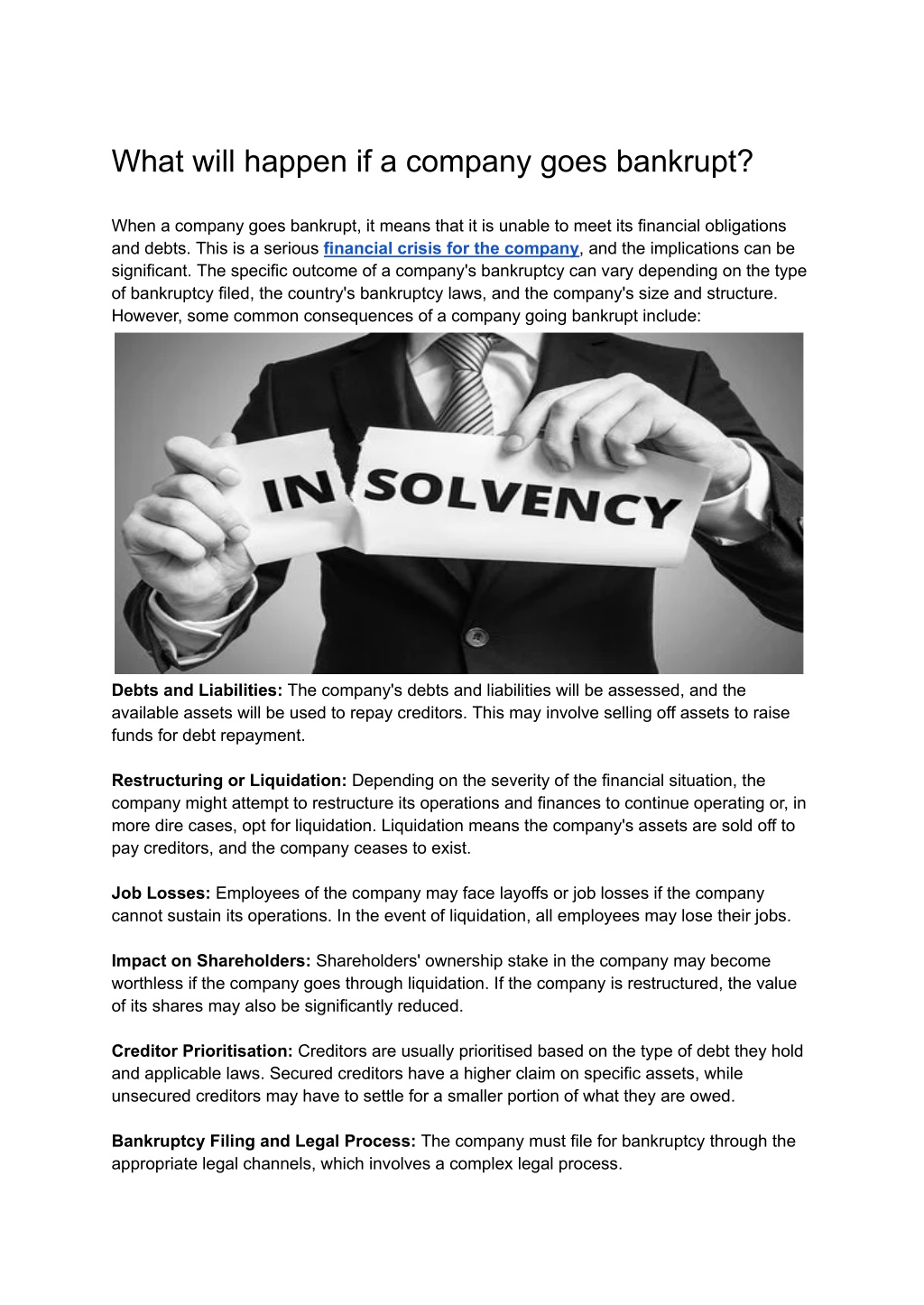Comprehending Company Administration: What Takes Place When a Company Goes into Administration in the UK?
Comprehending Company Administration: What Takes Place When a Company Goes into Administration in the UK?
Blog Article
Checking Out the Effect of a Company Going Into Management

Immediate Influence on Procedures
When an organization goes into administration, the immediate effect on its procedures can be significant, influencing different elements of its operating. Vendors and partners might become reluctant to engage with the organization, impacting the supply chain and possibly causing hold-ups or shortages in necessary resources.
Economically, the company may encounter limitations on its investing and investment choices, as managers take control to evaluate the scenario and determine the most effective training course of action. This can cause capital obstacles, making it difficult to satisfy commitments such as paying wages or clearing up billings promptly - what happens when a company goes into administration. Furthermore, the track record of the business may experience, as information of management spreads, potentially leading to a loss of client trust fund and commitment
Financial Ramifications for Stakeholders
The instant operational difficulties encountered by a service getting in management have substantial financial ramifications for stakeholders involved in the business's affairs. Shareholders commonly birth the burden of economic losses, experiencing a decrease in the worth of their financial investments as the firm's supply rates drop. Staff members encounter unpredictabilities concerning their earnings, benefits, and task safety and security, with prospective layoffs or decreased compensation packages impending. Distributors may encounter payment hold-ups and even non-payment for items or services provided, impacting their capital and overall stability. Furthermore, lenders face the danger of receiving only a fraction of the money owed to them, leading to possible losses and impacting their own financial wellness. On the various other hand, clients may additionally be impacted by a company entering into management, dealing with disruptions in solution, guarantee issues, or the loss of pre paid services or deposits. These economic ramifications highlight the causal sequence that a service entering management can have on numerous stakeholders, highlighting the importance of aggressive danger management and calculated planning.
Lawful Obligations and Obligations
When a service gets in management,Browsing the intricate web of legal obligations and responsibilities is a critical endeavor for all parties entailed. The administrators designated to look after the procedure have a responsibility to act in the most effective passions of the creditors. They have to conform with legal demands, such as preparing reports on the firm's economic situation and performing meetings with lenders to review the management procedure.
Staff members additionally have lawful civil liberties that need to be maintained during administration. Depending on the situations, they may be qualified to redundancy pay, notification pay, and various other benefits. It is vital for administrators to follow work regulations and make sure that workers are treated fairly throughout the procedure.
Lenders play a significant role in management. They can be informed concerning the firm's monetary status, participate in lenders' meetings, and ballot on essential choices. Administrators need to interact transparently with creditors and comply with legal methods to protect their wikipedia reference interests.
Possible for Company Restructuring
In the realm of business management, exploring the possibility for restructuring holds substantial guarantee for renewing a having a hard time company. When a service faces monetary distress or operational difficulties, restructuring uses a strategic technique to address underlying problems and place the company for future success. By reflecting on the organizational structure, functional processes, and monetary approaches, a company can carry out changes that improve performance, reduce expenses, and boost overall performance.
One secret facet of business restructuring is determining and resolving inefficiencies within the company. This might involve improving procedures, reapportioning sources, or reviewing the services or product offering to better align with market demands. In addition, restructuring can involve renegotiating agreements, financial debt responsibilities, or lease agreements to improve money circulation and reduce financial stress.
In addition, restructuring offers a chance to examine management duties, responsibilities, and decision-making processes to make moved here sure reliable administration and liability. By applying a well-balanced restructuring strategy, a business can navigate challenging times and arise more powerful and more resistant in the affordable market landscape.

Implications for Sector and Market
Taking into consideration the wider implications for sector and browse this site market characteristics, it becomes evident that an organization going through restructuring can set off causal sequences that resound throughout the competitive landscape. When a firm enters into administration, it can bring about enhanced competition as various other firms look for to fill the gap left by the having a hard time business. This intense competition can cause cost battles, advancement drives, or mergings and purchases as companies jostle for market share.
Moreover, the collapse of a service can also affect suppliers and partners within the sector - what does it mean to go into administration. Suppliers might encounter payment hold-ups and even defaults, affecting their very own economic stability. Partnerships that were reliant on the now-struggling organization may need to be reassessed or renegotiated, bring about further interruptions in the marketplace community
Final Thought

When a company goes into management, the instant impact on its procedures can be significant, influencing different facets of its working.The immediate operational challenges dealt with by a business going into administration have considerable financial ramifications for stakeholders entailed in the business's events (what does it mean to go into administration). These financial implications highlight the surge effect that a service entering administration can have on numerous stakeholders, underscoring the value of aggressive risk administration and critical planning
When a business goes right into management, it can lead to enhanced competition as various other companies seek to fill up the space left by the battling business.In final thought, the effect of an organization going into management is substantial, influencing operations, financial resources, legal commitments, and possibly leading to restructuring.
Report this page